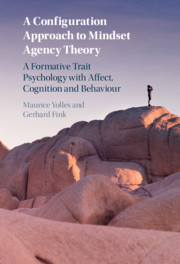 A Configuration Approach to Mindset Agency Theory
A Configuration Approach to Mindset Agency Theory from Part IV - Formal Possibilities in Mindset Agency Theory
Published online by Cambridge University Press: 28 July 2021
Sociohistory refers to: social event history that occurs in the past or future using appropriate formal theory; is concerned with the microcosms of social interaction; describes and explains practical situations; and with sufficient information, can predict either long-term large-scale or short-term small-scale sociocultural events (Yolles & Frieden, 2006). Sociohistorical inquiry involves wicked problems: those having a variety of dynamic event states and essential variables with values and relationships that may be hidden and therefore unknown or indeterminable (Churchman, 1967). Sociohistory is therefore perspective relative. To be convincing it thus requires multiple perspectives from a plurality of participating inquirers (Reiss & Sprenger, 2014).
To save this book to your Kindle, first ensure [email protected] is added to your Approved Personal Document E-mail List under your Personal Document Settings on the Manage Your Content and Devices page of your Amazon account. Then enter the ‘name’ part of your Kindle email address below. Find out more about saving to your Kindle.
Note you can select to save to either the @free.kindle.com or @kindle.com variations. ‘@free.kindle.com’ emails are free but can only be saved to your device when it is connected to wi-fi. ‘@kindle.com’ emails can be delivered even when you are not connected to wi-fi, but note that service fees apply.
Find out more about the Kindle Personal Document Service.
To save content items to your account, please confirm that you agree to abide by our usage policies. If this is the first time you use this feature, you will be asked to authorise Cambridge Core to connect with your account. Find out more about saving content to Dropbox.
To save content items to your account, please confirm that you agree to abide by our usage policies. If this is the first time you use this feature, you will be asked to authorise Cambridge Core to connect with your account. Find out more about saving content to Google Drive.